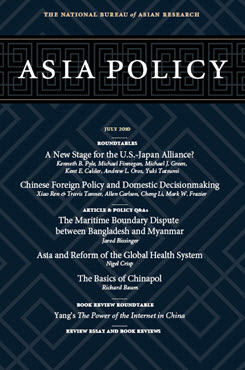A New Stage for the U.S.-Japan Alliance?
Asia Policy invited six distinguished scholars to offer their thoughts on these questions in an effort to inform the debate over the future of the U.S.-Japan alliance.
In January 2010, the United States and Japan celebrated the 50th anniversary of the bilateral security alliance between the two countries. However, official commemoration of the partnership—long considered the linchpin for maintaining peace and stability in Asia—occurred against the backdrop of significant strain in the relationship.
Long-simmering cleavages, most visibly the inability to implement an agreement on U.S. basing and force realignments signed in 2006, triggered reassessments and serious questions regarding the proper role of the alliance in meeting current and future challenges. What purpose does the alliance serve in 2010? Should it continue to exist? How should it be defined? What roles and missions should the partners undertake? What factors limit their ability to act?
Asia Policy has invited six distinguished scholars to offer their thoughts on these questions in an effort to inform the debate over the future of the U.S.-Japan alliance.
Troubled Alliance
Kenneth B. Pyle
Return to Basics: Recalibrating the U.S.-Japan Security Alliance
Michael Finnegan
Redefining and Reaffirming the U.S.-Japan Alliance
Michael J. Green
Alliance Endangered? Challenges from the Changing Political-Economic Context of U.S.-Japan Relations
Kent E. Calder
The 50th Anniversary: Time for a “Renewal of Vows”
Andrew L. Oros
A Short-Term Challenge to the U.S.-Japan Alliance Putting Its Long-Term Health at Risk
Yuki Tatsumi
About Asia Policy
Asia Policy is a peer-reviewed scholarly journal presenting policy-relevant academic research on the Asia-Pacific that draws clear and concise conclusions useful to today’s policymakers. Asia Policy is published quarterly in January, April, July, and October and accepts submissions on a rolling basis. Learn more


